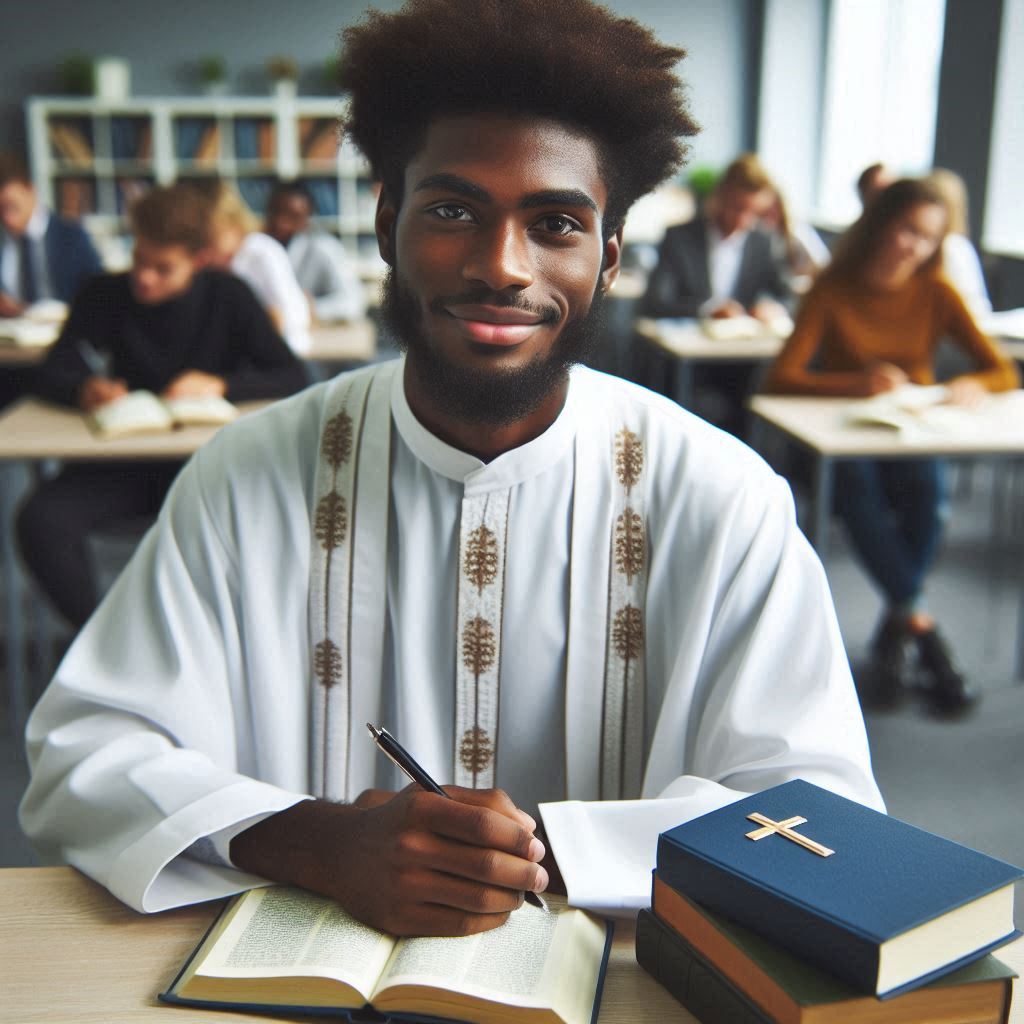Introduction
Nigerian religious festivals are essential cultural events that hold great significance in Nigerian society.
These festivals play a crucial role in preserving traditions, promoting unity, and fostering a sense of community.
Religious festivals are deeply ingrained in Nigerian culture, reflecting the rich diversity and heritage of the country.
One of the most significant aspects of Nigerian religious festivals is their ability to bring people together.
These celebrations provide an opportunity for individuals from different backgrounds to come together and celebrate their shared beliefs.
The diversity of religious festivals in Nigeria showcases the country’s multiculturalism and religious tolerance.
From Eid al-Fitr to Christmas, each festival brings its own unique traditions and practices that contribute to the cultural tapestry of Nigeria.
These festivals also serve as a platform for cultural exchange, as people from diverse religious backgrounds come together to participate in the festivities.
Overall, religious festivals in Nigeria play a vital role in preserving cultural heritage, promoting unity, and fostering a sense of community among its people.
Overview of Major Religious Festivals in Nigeria
Nigeria is a diverse country with a rich cultural heritage, and religious festivals play a significant role in shaping the identity of its people.
Some of the major religious festivals celebrated in Nigeria include:
- Eid al-Fitr: This is a major Islamic festival celebrated by Muslims worldwide to mark the end of Ramadan, the holy month of fasting.
- Christmas: Christmas is a Christian festival celebrated on December 25th each year to commemorate the birth of Jesus Christ.
- Easter: Easter is another Christian festival that celebrates the resurrection of Jesus Christ from the dead.
Popular Religious Festivals
- Eid al-Fitr: Eid al-Fitr, also known as the “Festival of Breaking the Fast,” is a joyous occasion for Muslims as they come together to offer prayers and give thanks for completing the month of Ramadan.
- Christmas: Christmas is widely celebrated in Nigeria, with Christians attending church services, exchanging gifts, and sharing meals with family and friends to mark the birth of Jesus Christ.
- Easter: Easter is a time of reflection and celebration for Nigerian Christians, who participate in church services, Easter egg hunts, and feasting to commemorate the resurrection of Jesus Christ.
Significance of these Festivals in Nigeria
Religious festivals hold immense significance in Nigeria, as they provide a sense of community, continuity of tradition, and spiritual renewal for believers across different religious communities.
During these festivals, Nigerians come together to celebrate their faith, strengthen familial bonds, share meals, and engage in acts of charity and goodwill towards others.
These festivals also serve as an opportunity for Nigerians to showcase their rich cultural heritage through traditional music, dance, attire, and cuisine, thus promoting unity and diversity within the country.
Overall, religious festivals in Nigeria play a crucial role in preserving and transmitting religious beliefs, cultural values, and social norms from one generation to the next, fostering a sense of unity and cohesion among its people.
Read: Prominent Cultural Studies Journals in Nigeria
Cultural Impact of Nigerian Religious Festivals
Religious festivals in Nigeria have a profound influence on the country’s culture and traditions.
These festivals are not just religious events but also significant cultural celebrations that bring people together from different backgrounds.
Influence of Religious Festivals on Nigerian Culture and Traditions
Religious festivals in Nigeria play a vital role in preserving and promoting traditional values and customs.
These festivals provide a platform for Nigerians to showcase their rich cultural heritage through various activities such as music, dance, and art.
They serve as a reminder of the importance of cultural diversity and the need to respect and celebrate different cultural practices.
Through these festivals, younger generations are introduced to their cultural roots and are encouraged to embrace and carry forward their heritage.
Participation in religious festivals helps in reinforcing national identity and fostering a sense of belonging and pride among Nigerians.
How Religious Festivals Promote Unity and Diversity Among Different Ethnic Groups in Nigeria
Religious festivals bring people from various ethnic groups together, fostering unity and promoting peaceful coexistence.
These festivals serve as a platform for different tribes and communities to interact, share experiences, and learn from one another.
They help in breaking down barriers and stereotypes, promoting understanding and acceptance among diverse groups in the country.
By celebrating religious festivals together, Nigerians learn to appreciate the similarities and differences in their cultural practices.
Through these festivals, a sense of national unity is strengthened, transcending ethnic boundaries and fostering a spirit of solidarity.
In essence, Nigerian religious festivals play a crucial role in shaping the country’s cultural landscape and promoting unity and diversity among its people.
These festivals serve as a bridge that connects different ethnic groups and generations, fostering a sense of national identity and pride.
Read: Religious Studies Fieldwork in Nigerian Communities
Role of traditional beliefs in Nigerian religious festivals
Traditional beliefs play a significant role in Nigerian religious festivals by:
Incorporation of traditional beliefs and practices into religious festivals
Many Nigerian religious festivals are a blend of traditional beliefs and practices with Christianity or Islam.
For example, during the Osun-Osogbo Festival, traditional rites are performed to honor the river goddess Osun.
These rituals are believed to bring blessings and prosperity to the community and are an integral part of the festival.
By incorporating traditional beliefs into religious festivals, Nigerians are able to maintain a connection to their cultural roots.
This fusion of traditional and religious elements helps to create a unique and vibrant celebration that reflects Nigeria’s rich cultural diversity.
Preservation of cultural heritage through religious celebrations
Nigerian religious festivals serve as a way to preserve and showcase the country’s rich cultural heritage.
These festivals often include traditional dances, music, and art forms that have been passed down through generations.
For example, the Durbar Festival in northern Nigeria features colorful horse parades and displays of traditional attire.
Transform Your Career with Expert Guidance
Get personalized mentorship consulting that’s tailored to your unique path. Our expert advice is actionable and exclusive.
Get StartedBy incorporating these cultural elements into religious celebrations, Nigerians are able to pass on their traditions to future generations.
These festivals also attract tourists from around the world, promoting cultural exchange and understanding.
In fact, the role of traditional beliefs in Nigerian religious festivals is essential for preserving cultural heritage and promoting unity and diversity.
Read: Sociology’s Role in Nigerian Educational Reform

Economic impact of religious festivals in Nigeria
Economic activities and opportunities generated during religious festivals
Religious festivals in Nigeria have a significant economic impact on the country, generating a multitude of economic activities and opportunities during these events.
Here is an analysis of the economic activities and opportunities that are generated during religious festivals:
- Trade and Commerce: Religious festivals serve as a platform for a bustling market where vendors and traders display their goods and services.
- Job creation: These festivals create temporary employment opportunities for locals as they work in various capacities during the events.
- Revenue generation: The influx of people during religious festivals leads to increased sales and revenue for businesses in the host communities.
- Infrastructure development: Host communities often upgrade their infrastructure to accommodate the influx of visitors, leading to further development.
Contribution of religious festivals to the tourism industry in Nigeria
Religious festivals play a crucial role in promoting tourism in Nigeria, attracting both domestic and international visitors to the country.
Here are some ways in which religious festivals contribute to the tourism industry in Nigeria:
- Cultural exchange: Visitors get to experience the rich cultural heritage of Nigeria during religious festivals, promoting cultural exchange.
- Boost in tourism revenue: The increased influx of tourists during religious festivals leads to a boost in revenue for the tourism industry.
- Promotion of local businesses: Small businesses in the host communities benefit from the increased patronage during these events.
- Creation of tourist attractions: Religious festivals often showcase unique traditions and customs that become tourist attractions, further promoting tourism in Nigeria.
Read: Health and Sociology: Nigerian Case Studies
Challenges and controversies surrounding Nigerian religious festivals
Conflicts that arise during religious festivals
Religious festivals in Nigeria, like in many other parts of the world, are not without challenges and controversies.
These events, which are supposed to bring people together in faith and celebration, sometimes lead to conflicts and disagreements.
During religious festivals in Nigeria, conflicts often arise due to differences in beliefs and practices.
For example, there may be disagreements between traditionalists and adherents of organized religions like Christianity and Islam.
One major source of conflict during Nigerian religious festivals is the clash between traditional cultural practices and modern religious beliefs.
This clash often manifests in disagreements over the proper way to observe certain rituals and ceremonies.
Controversial practices and beliefs associated with certain festivals
Controversial practices and beliefs associated with certain festivals also contribute to the challenges and controversies surrounding Nigerian religious events.
For instance, some festivals involve sacrifices or rituals that are deemed unacceptable by certain groups or individuals.
The issue of inclusivity and tolerance also comes into play during Nigerian religious festivals.
There are instances where certain groups feel marginalized or excluded from participating fully in these events, leading to tensions and conflicts.
Additionally, the commercialization of religious festivals in Nigeria has become a point of contention.
Some critics argue that the focus on making money and selling goods during these events detracts from their spiritual significance and authenticity.
Another challenge associated with Nigerian religious festivals is the issue of cultural appropriation.
There are concerns that some festivals may misrepresent or exploit aspects of traditional Nigerian culture for commercial gain or entertainment purposes.
In general, while Nigerian religious festivals are meant to be times of joy, reflection, and community, they also present challenges and controversies.
Addressing these issues requires open dialogue, respect for diverse beliefs, and a commitment to promoting inclusivity and understanding.
Conclusion
To wrap up, Nigerian religious festivals significantly impact the country’s culture. These events showcase cultural importance.
From the vibrant colors of the outfits to the rhythmic sounds of the drums, these festivals showcase the rich cultural heritage of Nigeria.
These festivals serve as a reflection of the diversity and unity among different ethnic groups in Nigeria.
They bring people together, fostering a sense of community and belonging among participants.
Moreover, religious festivals in Nigeria actively preserve traditional values, beliefs, and practices. These celebrations pass down generational heritage.
They are a testament to the resilience and strength of Nigerian culture.
Overall, these festivals play a crucial role in shaping the cultural landscape of Nigeria.
They serve as a platform for cultural exchange, promoting tolerance, understanding, and respect for all traditions and beliefs.
Through these celebrations, Nigerians are able to showcase their rich cultural heritage to the world, highlighting the beauty and diversity of their traditions.
The impact of religious festivals on the societal fabric of Nigeria cannot be understated.
Nigerian religious festivals not only provide a platform for spiritual fulfillment but also serve as a vibrant display of the country’s cultural identity.
They are a celebration of diversity, unity, and tradition that have stood the test of time.




